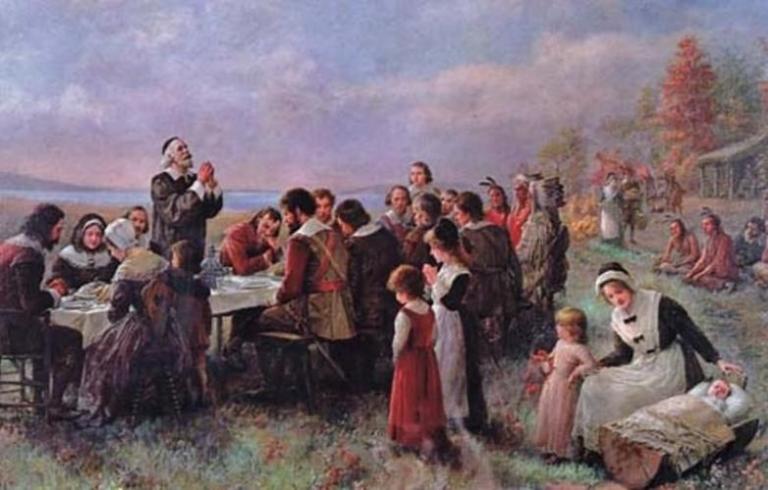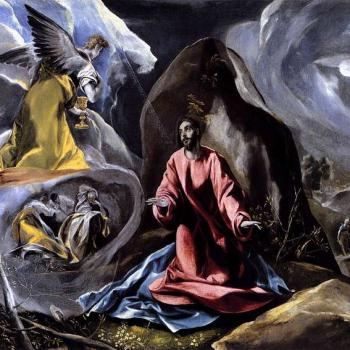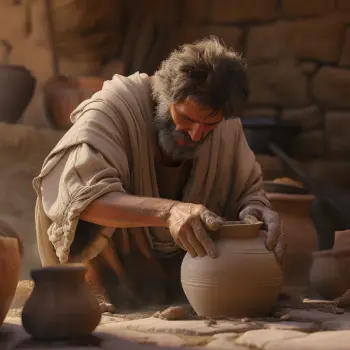Thanksgiving is, of course, a national holiday. But devoting specific days for the purpose of giving thanks and giving thanks by eating a ritual feast have strong Biblical precedent.
The ancient Hebrews were commanded to hold three days of thanksgiving: one for their freedom; one for their land; and one for their harvest. America has one day, but we are giving thanks for basically the same three things.
Of course the observances of the Israelites had to do with God’s covenant with them. America, as a whole, is under no such covenant, so our Thanksgiving is a “secular holiday.” But Christians know that God is hidden even in the secular realm, so it is fitting to thank Him for His providential care for our country. We can join our fellow citizens in gratitude for our nation, our liberties, and our prosperity, using the occasion also to thank God for our personal blessings.
It’s interesting that we express our gratitude by eating a really big meal. What’s the connection between being thankful and eating a lot? Aren’t we using up the blessings we have been given? Shouldn’t we be more thrifty with them? Shouldn’t we save up our food for times of emergency?
The answer, of course, is no. To feast is to enjoy God’s generosity, to revel in His gifts, and to express our confidence that He will continue to provide.
The Bible makes the connection between thanksgiving and feasting.
Among the sacrifices prescribed for the Tabernacle and the Temple is a sacrifice for Thanksgiving. This consisted of unleavened bread and the slaughter of a lamb or goat.
This was a type of peace offering, establishing peace with God, but whereas a regular peace offering was completely burned, the sacrifice of thanksgiving was shared with the priests. But then the rest of the bread and the meat was eaten by the sacrificer and his family.
Here is the description of the thanksgiving sacrifice from Leviticus:
11 “And this is the law of the sacrifice of peace offerings that one may offer to the Lord. 12 If he offers it for a thanksgiving, then he shall offer with the thanksgiving sacrifice unleavened loaves mixed with oil, unleavened wafers smeared with oil, and loaves of fine flour well mixed with oil. 13 With the sacrifice of his peace offerings for thanksgiving he shall bring his offering with loaves of leavened bread.14 And from it he shall offer one loaf from each offering, as a gift to the Lord. It shall belong to the priest who throws the blood of the peace offerings. 15 And the flesh of the sacrifice of his peace offerings for thanksgiving shall be eaten on the day of his offering. He shall not leave any of it until the morning. (Leviticus 7: 11-15)
Evidently, a main difference between thanksgiving feasts then and now is that under the Levitical code, there may be no leftovers!
In Psalms 50, the Lord expresses His disdain for sacrifices offered out of false piety, hypocritical immorality, and lack of faith. The Psalmist refers to sacrifices of thanksgiving, but then turns the term around so that thanksgiving becomes the sacrifice.
The one who offers thanksgiving as his sacrifice glorifies me;
to one who orders his way rightly
I will show the salvation of God!” (Psalm 50: 23)
A thankful heart is what God desires, whatever the external manifestations of feasting, traditions, and customs, however worthy those might be.
Grant this, Lord, to us all!
Have a Thanksgiving full of gratitude!
Illustration: Thanksgiving, Brownscombe, via Pixnio, Public Domain.

















